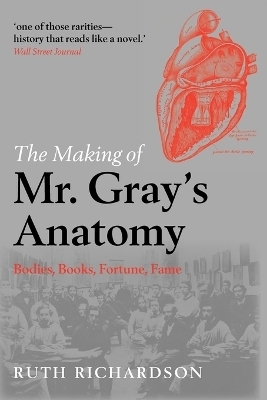
The Making of Mr Gray's Anatomy
Bodies, books, fortune, fame
Seiten
2009
Oxford University Press (Verlag)
978-0-19-957028-7 (ISBN)
Oxford University Press (Verlag)
978-0-19-957028-7 (ISBN)
The Making of Mr Gray's Anatomy tells the story of one of the most iconic scientific books ever published: a textbook of anatomy that is still a household name 150 years since its first edition. It is the story of the remarkable and dedicated characters who created it, of poverty, class, and science and society in Victorian London.
Gray's Anatomy is probably one of the most iconic scientific books ever published: an illustrated textbook of anatomy that is still a household name 150 years since its first edition, known for its rigorously scientific text, and masterful illustrations as beautiful as they are detailed.
The Making of Mr Gray's Anatomy tells the story of the creation of this remarkable book, and the individuals who made it happen: Henry Gray, the bright and ambitious physiologist, poised for medical fame and fortune, who was the book's author; Carter, the brilliant young illustrator, lacking Gray's social advantages, shy and inclined to religious introspection; and the publishers - Parkers, father and son, the father eager to employ new technology, the son part of a lively circle of intellectuals. It is the story of changing attitudes in the mid-19th century; of the social impact of science, the changing status of medicine; of poverty and class; of craftsmanship and technology. And it all unfolds in the atmospheric milieu of Victorian London - taking the reader from the smart townhouses of Belgravia, to the dissection room of St George's Hospital, and to the workhouses and mortuaries where we meet the friendless poor who would ultimately be immortalised in Carter's engravings.
Alongside the story of the making of the book itself, Ruth Richardson reflects on what made Gray's Anatomy such a unique intellectual, artistic, and cultural achievement - how it represented a summation of a long half century's blossoming of anatomical knowledge and exploration, and how it appeared just at the right time to become the 'Doctor's Bible' for generations of medics to follow.
Gray's Anatomy is probably one of the most iconic scientific books ever published: an illustrated textbook of anatomy that is still a household name 150 years since its first edition, known for its rigorously scientific text, and masterful illustrations as beautiful as they are detailed.
The Making of Mr Gray's Anatomy tells the story of the creation of this remarkable book, and the individuals who made it happen: Henry Gray, the bright and ambitious physiologist, poised for medical fame and fortune, who was the book's author; Carter, the brilliant young illustrator, lacking Gray's social advantages, shy and inclined to religious introspection; and the publishers - Parkers, father and son, the father eager to employ new technology, the son part of a lively circle of intellectuals. It is the story of changing attitudes in the mid-19th century; of the social impact of science, the changing status of medicine; of poverty and class; of craftsmanship and technology. And it all unfolds in the atmospheric milieu of Victorian London - taking the reader from the smart townhouses of Belgravia, to the dissection room of St George's Hospital, and to the workhouses and mortuaries where we meet the friendless poor who would ultimately be immortalised in Carter's engravings.
Alongside the story of the making of the book itself, Ruth Richardson reflects on what made Gray's Anatomy such a unique intellectual, artistic, and cultural achievement - how it represented a summation of a long half century's blossoming of anatomical knowledge and exploration, and how it appeared just at the right time to become the 'Doctor's Bible' for generations of medics to follow.
Ruth Richardson works for the Institute of Historical Research, London, and is the author of Death, Dissection, and the Destitute.
Introduction ; 1. The Words: Mr Gray of Belgravia ; 2. The Pictures: Dr Carter of Scarborough ; 3. The Enterprise: J.W.Parker & Son of West Strand ; 4. The Process of Creation: Person or Persons Unknown ; 5. The Raw Material: The Friendless Poor of London ; 6. The Process of Creation ; 7. The Process of Production ; 8. 1858: The Book Appears ; 9. Calamity ; 10. Futurity ; Acknowledgements ; References ; Bibliography ; Index
| Erscheint lt. Verlag | 8.10.2009 |
|---|---|
| Zusatzinfo | Illustrations throughout |
| Verlagsort | Oxford |
| Sprache | englisch |
| Maße | 156 x 232 mm |
| Gewicht | 593 g |
| Themenwelt | Sachbuch/Ratgeber ► Natur / Technik |
| Geschichte ► Allgemeine Geschichte ► Neuzeit (bis 1918) | |
| Medizin / Pharmazie ► Medizinische Fachgebiete | |
| Studium ► 1. Studienabschnitt (Vorklinik) ► Anatomie / Neuroanatomie | |
| Studium ► Querschnittsbereiche ► Geschichte / Ethik der Medizin | |
| ISBN-10 | 0-19-957028-0 / 0199570280 |
| ISBN-13 | 978-0-19-957028-7 / 9780199570287 |
| Zustand | Neuware |
| Informationen gemäß Produktsicherheitsverordnung (GPSR) | |
| Haben Sie eine Frage zum Produkt? |
Mehr entdecken
aus dem Bereich
aus dem Bereich
Giordano Bruno - ein ketzerisches Leben
Buch | Hardcover (2024)
C.H.Beck (Verlag)
CHF 41,85
das dramatische 16. Jahrhundert
Buch | Hardcover (2024)
Rowohlt Berlin (Verlag)
CHF 47,60


